The 2012 University of Tokyo Autumn Entrance Ceremony
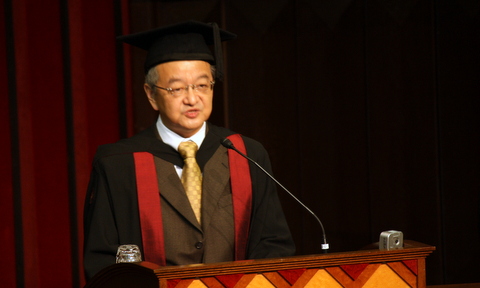
The 2012 University of Tokyo Autumn Entrance Ceremony was held at the Yasuda Auditorium on Thursday, 4 October.
GraSPP welcomed 36 new students this Autumn.
Prof. Takatoshi Ito, Dean of the GraSPP, made a welcome address on behalf of all deans of the graduate schools at the University of Tokyo.
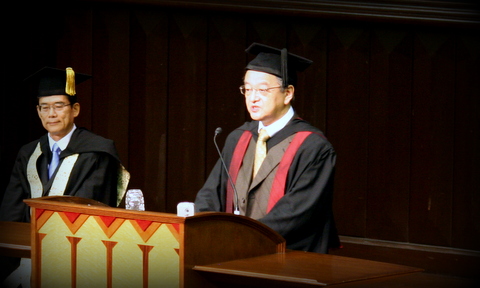
Welcome Speech For Incoming Class of Fall 2012
October 4, 2012
We are very happy to welcome you as incoming students of Fall 2012 at the University of Tokyo. Although a majority of both undergraduate and graduate students enter the University in April—the beginning of traditional Japanese academic year—we have started and expanded our October intake in recent years. Students starting in the fall are mostly those in various international programs that are taught in English. Although the University of Tokyo has hosted many exchange students and research visitors in the past, it is relatively new that the University created several degree programs that are taught in English. The University is moving toward full internationalization and globalization: The numbers of English-taught classes and international students are increasing very quickly.
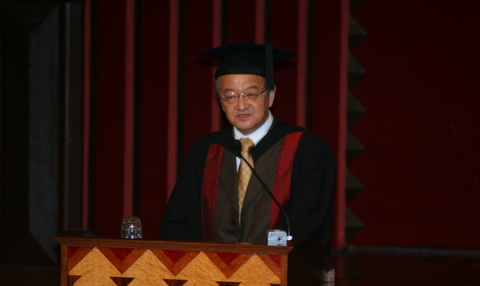
There are several international programs that are taught in English in different schools within the University of Tokyo. Although we share information so that we can provide better academic environment for foreign students, each program is quite independent. Let me give some information, as an example, on the Graduate School of Public Policy where I am Dean. We established an international program in Master of Public Policy—MPP/IP for short—two years ago. Just last week we sent off the first class of our graduates.
Prior to establishing MPP/IP, the Graduate School of Public Policy—or GraSPP for short—had engaged in exchange students with Columbia University, Lee Kuan Yew School of Public Policy, and Sciences Po, so an introduction of international program at GraSPP was a natural next step toward full internationalization. We now have double degree programs with those affiliated schools, I have just mentioned.
Now GraSPP has one-third of students from abroad, and two-thirds from Japanese universities. Students take the same classes taught in English. It is not yet, but getting close to, an ideal cosmopolitan campus at the University of Tokyo: Future leaders of Asia, future leaders in international community at large, and future leaders of Japan share experiences of academic and social life, here at the University.
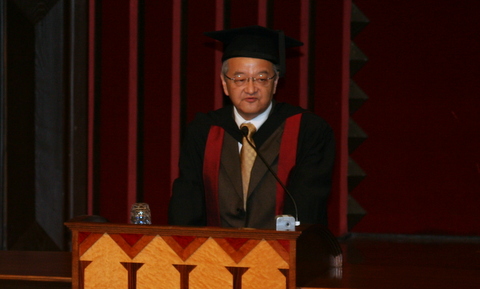
Ladies and Gentlemen,
Now you are starting your student life at the University of Tokyo. Some of you are quite excited about the opportunities to learn here; and some of you are not so confident and nervous at uncertainties regarding life in Tokyo. I would not worry about social life in Tokyo, as Japanese people are known to be very helpful to foreigners as well as fellow Japanese. On the other hand, academic life at University can be difficult and challenging. Let me give you my thoughts, as an economist, about University education.
We, as faculty, are confident that what we teach here will become a part of your lifelong assets in what economists call “human capital.” Indeed the University is the place that you invest in yourself. Returns to the investment will last for the rest of your life. Returns may take a form of increased compensation at your work—this we call private returns. Of course, financial returns are not all of what you will gain. Returns include psychological satisfaction and sense of achievement. But, returns may also take a form of contribution to the society. What you invent or what you create with better education may have far greater value to the society at large. You may not be rewarded for the increased technological advance that the society receives from your contribution in knowledge. Simply put, output from your increased human capital exceeds your private return. This we call social returns. Suppose you invent a new drug that cures a particular form of cancer. You obtain a patent on the drug. The patent earns you private returns; but values to patients and the society at large are more than financial returns you receive. Patients may receive good health; families are happy; and benefits may go far beyond what they pay as costs of drugs. This is social returns. University education gives you both private returns and social returns.
The similar statement can be made for education for future political leaders or corporate executives. We should not lose sight on social returns.
One of the reasons why many countries and states have subsidized university education with tax payers’ money is precisely the existence of social returns. You are lucky to earn private returns that go beyond costs of tuition, time, and efforts, but the society is lucky to have you at the University of Tokyo, since we believe that your contribution to the society later is worth Japanese tax payers' money.
In the globalized world, benefits to the society go much farther than the country's border. Can you imagine the world without computers; without operating systems of computers; and without social networking service? Those inventers have become billionaires, but social returns are much larger than their private returns. Although some of those geniuses contributing to the current IT world are former drop outs from University, their experiences at University undoubtedly inspired their future inventions. And some of them have contributed back to the society through philanthropy activities.
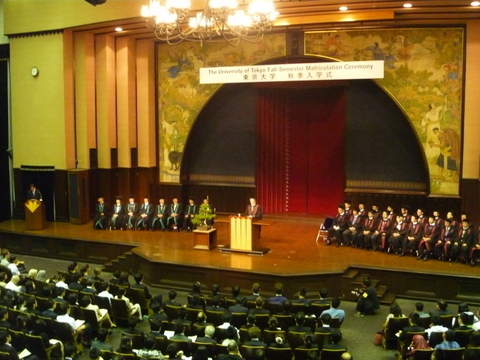
Ladies and Gentlemen,
Many of you are from Asia. Some of you are from other regions, having strong interest in Asia. The 21st century is said to be Asia's century.
Asia used to be a region of poverty. The so-called poverty-trap was common place. People were poor, so that they cannot obtain sanitary environment for healthy life or education. Hence, their human capital remained low, and earnings would not rise. In fact, Dr. Gunnar Myrdal, who later would receive the Nobel Prize for economics, published a book called, Asian Drama: An Inquiry into the Poverty of Nations, (Allen Lane, 1968) in 1968. In his book, Myrdal studied the Southeast Asia, in particular, India and Indonesia. He advocated population control, promotion of agriculture, investment in health care and education. He was pessimistic about domestic investment for industrialization and exports. Clearly he viewed large population as disadvantage, and his predicament on Asia was rather pessimistic.
One of the most popular books that changed the image of Asia was published after many Asian countries achieved high growth: The World Bank's The East Asian Miracle, (Oxford University Press, 1993) in 1993. The book gave Asian economies with congratulatory remarks and optimistic views. Asian countries, unlike Latin American and African countries, succeeded in achieving high economic growth by promoting manufacturing and exports.
However, the optimism was dashed in the Asian currency crisis of 1997-98. The economies in Asia suffered from currency crisis, banking crisis and deep recession. Moreover, Asia was accused of having crony capitalism, too much government intervention and poor banking supervision. The regional effort was made to provide liquidity to Asian countries. The so-called Asian Monetary Fund (AMF) was proposed, but it did not realize due to oppositions of the European-controlled IMF and US Treasury. They argued that Asian countries cannot be tough on each other so the conditionality (=conditions for liquidity assistant) would be too soft.
Fifteen years later, Europe is now in crisis. They are now creating their own regional mechanism, called European Stability Mechanism (ESM). This is a mechanism very similar to what Asian countries originally aiming at.
The point is that a region experiences the rise and fall of economic conditions and management. So is economic thinking.
This is history.
Now you will have a chance to make a history in the 21st century. You will experience firsthand the rise of Asia. This is exciting. Not only you witness, but make impact on the history of Asia in the 21st century. You are so lucky to be here. Do not be arrogant, even if you, or your country, become successful, because troubles may be around the corner. You have to be humble, always—that is what history teaches us.
Again, congratulations and welcome!
Thank you.

